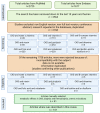Demand for Water-Soluble Vitamins in a Group of Patients with CKD versus Interventions and Supplementation-A Systematic Review
- PMID: 36839219
- PMCID: PMC9964313
- DOI: 10.3390/nu15040860
Demand for Water-Soluble Vitamins in a Group of Patients with CKD versus Interventions and Supplementation-A Systematic Review
Abstract
Background: Increasingly, chronic kidney disease (CKD) is becoming an inevitable consequence of obesity, metabolic syndrome, and diabetes. As the disease progresses, and through dialysis, the need for and loss of water-soluble vitamins both increase. This review article looks at the benefits and possible risks of supplementing these vitamins with the treatment of CKD.
Methods: Data in the PubMed and Embase databases were analyzed. The keywords "chronic kidney disease", in various combinations, are associated with thiamin, riboflavin, pyridoxine, pantothenic acid, folates, niacin, cobalamin, and vitamin C. This review focuses on the possible use of water-soluble vitamin supplementation to improve pharmacological responses and the overall clinical condition of patients.
Results: The mechanism of supportive supplementation is based on reducing oxidative stress, covering the increased demand and losses resulting from the treatment method. In the initial period of failure (G2-G3a), it does not require intervention, but later, especially in the case of inadequate nutrition, the inclusion of supplementation with folate and cobalamin may bring benefits. Such supplementation seems to be a necessity in patients with stage G4 or G5 (uremia). Conversely, the inclusion of additional B6 supplementation to reduce CV risk may be considered. At stage 3b and beyond (stages 4-5), the inclusion of niacin at a dose of 400-1000 mg, depending on the patient's tolerance, is required to lower the phosphate level. The inclusion of supplementation with thiamine and other water-soluble vitamins, especially in peritoneal dialysis and hemodialysis patients, is necessary for reducing dialysis losses. Allowing hemodialysis patients to take low doses of oral vitamin C effectively reduces erythropoietin dose requirements and improves anemia in functional iron-deficient patients. However, it should be considered that doses of B vitamins that are several times higher than the recommended dietary allowance of consumption may exacerbate left ventricular diastolic dysfunction in CKD patients.
Conclusions: Taking into account the research conducted so far, it seems that the use of vitamin supplementation in CKD patients may have a positive impact on the treatment process and maintaining a disease-free condition.
Keywords: chronic kidney disease; vitamin C; vitamin supplementation; vitamins B.
Conflict of interest statement
The authors declare no conflict of interest.
Figures
Similar articles
-
Folic acid with or without vitamin B12 for cognition and dementia.Cochrane Database Syst Rev. 2003;(4):CD004514. doi: 10.1002/14651858.CD004514. Cochrane Database Syst Rev. 2003. Update in: Cochrane Database Syst Rev. 2008 Oct 08;(4):CD004514. doi: 10.1002/14651858.CD004514.pub2. PMID: 14584018 Updated.
-
EORTC guidelines for the use of erythropoietic proteins in anaemic patients with cancer: 2006 update.Eur J Cancer. 2007 Jan;43(2):258-70. doi: 10.1016/j.ejca.2006.10.014. Epub 2006 Dec 19. Eur J Cancer. 2007. PMID: 17182241
-
Calcium supplementation commencing before or early in pregnancy, or food fortification with calcium, for preventing hypertensive disorders of pregnancy.Cochrane Database Syst Rev. 2017 Sep 26;9(9):CD011192. doi: 10.1002/14651858.CD011192.pub2. Cochrane Database Syst Rev. 2017. Update in: Cochrane Database Syst Rev. 2019 Sep 16;9:CD011192. doi: 10.1002/14651858.CD011192.pub3. PMID: 28949421 Free PMC article. Updated.
-
Micronutrient supplementation in adults with HIV infection.Cochrane Database Syst Rev. 2017 May 18;5(5):CD003650. doi: 10.1002/14651858.CD003650.pub4. Cochrane Database Syst Rev. 2017. PMID: 28518221 Free PMC article.
-
Interventions for chronic kidney disease-associated restless legs syndrome.Cochrane Database Syst Rev. 2016 Nov 7;11(11):CD010690. doi: 10.1002/14651858.CD010690.pub2. Cochrane Database Syst Rev. 2016. PMID: 27819409 Free PMC article.
Cited by
-
The impact of homocysteine on patients with diabetic nephropathy: a mendelian randomization study.Acta Diabetol. 2025 Jan;62(1):123-130. doi: 10.1007/s00592-024-02343-9. Epub 2024 Aug 6. Acta Diabetol. 2025. PMID: 39105808
-
Does Vitamin Supplementation Play a Role in Chronic Kidney Disease?Nutrients. 2023 Jun 23;15(13):2847. doi: 10.3390/nu15132847. Nutrients. 2023. PMID: 37447174 Free PMC article. Review.
-
Water-Soluble Vitamins Stability by Robust Liquid Chromatography-Mass Spectrometry.Ann Nutr Metab. 2025;81(1):32-40. doi: 10.1159/000541587. Epub 2024 Sep 30. Ann Nutr Metab. 2025. PMID: 39348803 Free PMC article.
-
Paraoxonase 1 Activity and Renal Replacement Therapy for Chronic Renal Failure: A Meta-Analysis.J Clin Med. 2023 Aug 4;12(15):5123. doi: 10.3390/jcm12155123. J Clin Med. 2023. PMID: 37568524 Free PMC article.
-
The role of different nutrients in the prevention and treatment of cardiovascular diseases.Front Immunol. 2024 May 10;15:1393378. doi: 10.3389/fimmu.2024.1393378. eCollection 2024. Front Immunol. 2024. PMID: 38799425 Free PMC article. Review.
References
-
- Levin A., Stevens P.E., Bilous R.W., Coresh J., De Francisco A.L., De Jong P.E., Griffith K.E., Hemmelgarn B.R., Iseki K., Lamb E.J., et al. Kidney Disease Improving Global Outcomes—KDIGO 2012 Clinical Practice Guideline for the Evaluation and Management of Chronic Kidney Disease. Kidney Int. Suppl. 2013;1:1–150. - PubMed
-
- [(accessed on 28 November 2022)]. Available online: https://www.who.int/
Publication types
MeSH terms
Substances
LinkOut - more resources
Full Text Sources
Medical
Research Materials
Miscellaneous



